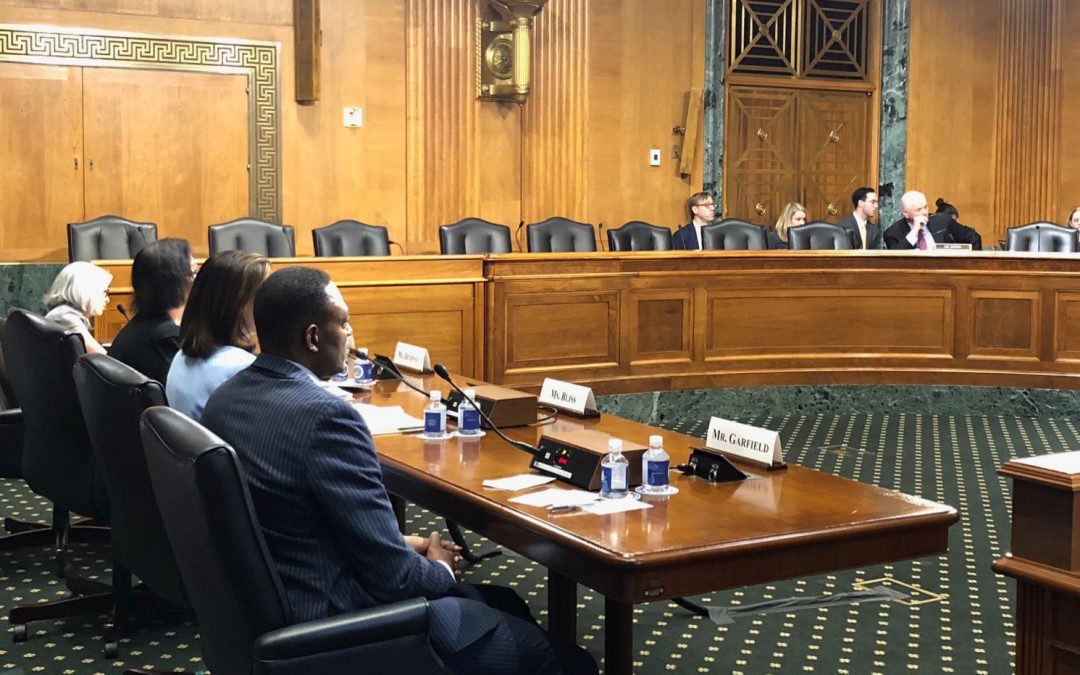WASHINGTON — A coalition of U.S. businesses told Congress Wednesday the Trump administration’s plan of steadily imposing more punitive tariffs on China is “counterproductive” and will not resolve a steep trade imbalance or help American consumers.
“We cannot unilaterally punish China into changing its behavior,” Dean Garfield, CEO of the Information Technology Industry Council, said at the hearing “Market Access Challenges in China” before subcommittee of the Senate Committee on Finance.
“Tariffs ultimately amount to a tax on American consumers,” Garfield said, and do little to curb the U.S. massive trade deficit with China, which stood at $337 billion in 2017, according to the Bureau of Economic Analysis.
Garfield attended the hearing on behalf of technology companies such as Amazon, Facebook and Google. He joined other groups who represented U.S. services and manufactory industries to lobby lawmakers at the hearing for “tailored and strategic” remedies to “avoid causing unnecessary harm” to the economy.
To reduce the growing trade imbalance, the United States and China should establish a new, bilateral trade agreement that “wholly restructures our economic relationship with China,” said Linda Dempsey from the National Association of Manufacturers.
“This is at once both a radical idea and, in our estimation, the most pragmatic and effective way forward,” Dempsey told the Subcommittee on International Trade, Customs, and Global Competitiveness.
The hearing came a day before Trump said he would entertain talks about rejoining the Trans Pacific Partnership and as fears of a trade war between the U.S. and China percolate, as both Trump and Chinese President Xi Jinping have announced escalating tariffs on wide swaths of products crucial to both economies. Giant technology companies such as Apple have been in the spotlight since the tariffs were announced.The tech-heavy Nasdaq composite dropped more than 6 percent in the wake of the tariff announcements, after rising steadily to begin 2018.
In March, Trump thwarted the takeover of Qualcomm Inc. by Singapore’s Broadcom Ltd., on concerns that a foreign takeover of chipmaker Qualcomm would hurt its race with China’s Huawei Technologies Co. to dominate 5G wireless communications.
On Tuesday, Xi delivered a speech that appeared to extend an olive branch to the Trump administration, announcing Beijing was committed to broadening its market access, including lowering tariffs on imported American automobiles by the end of the year.
Xi’s remarks had the effect of calming jittery global markets, which have been increasingly volatile amid fears of the broader effects a trade war could have on the strengthening U.S. economy.
They advocated measures such as multinational pressure against China’s unilateral implementation of technology standards, holding the country accountable for its “market access restrictions” with “real consequences” when it disregards World Trade Organization rulings, and increasing science and technology education for American students to better compete with Chinese graduates.
Garfield said China had more than eight times as many graduates as the U.S. in science, technology, engineering and mathematics (STEM) in 2016, leading him to acknowledge “we must also step up our game” to compete.
“The bottom line is that the United States is failing itself by not seriously investing in our country’s technological and economic future,” Garfield concluded.
Published in conjunction with 

